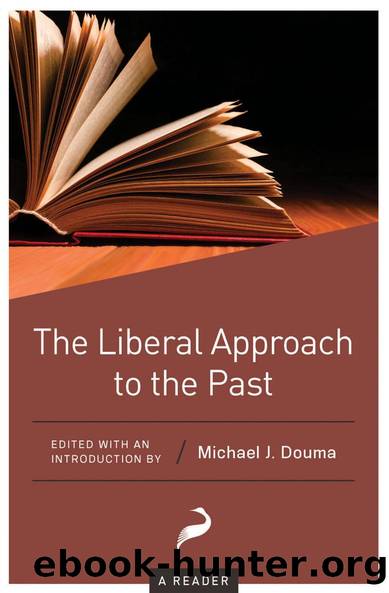The Liberal Approach to the Past by Michael J. Douma

Author:Michael J. Douma [Douma, Michael J.]
Language: eng
Format: epub
ISBN: 9781952223105
Barnesnoble:
Publisher: Cato Institute
Published: 2020-09-08T00:00:00+00:00
10
F. A. Hayek
âThe Historicism of the Scientistic Approach,â in The Counter-Revolution of Science: Studies on the Abuse of Reason (Indianapolis: Liberty Fund, 1979 [originally published 1952])
Friedrich August Hayek (1899â1992) was born and educated in Austria, but spent most of his academic career in London, Chicago, and Freiburg. He shared the 1974 Nobel Prize in Economics with Gunnar Myrdal, and is known for his many and varied contributions to economics and social and political theory.
Hayekâs most recognized contribution to history is certainly his edited book Capitalism and the Historians (1954), which defended the view that the Industrial Revolution in England raised material standards of living and largely improved the lives of workers.
Hayekâs chapter reproduced here should be read as his theoretical statement about history. The book in which this appeared, The Counter-Revolution of Science, found an audience among social scientists but appears to have had little reception among historians. In the book, Hayek explains that natural science is concerned with the relation of things to things, whereas social science is interested in the relation of men to men, or men to things. After the growth of science in the Scientific Revolution, Hayek observes a âcounterrevolutionâ in which science has extended beyond its legitimate domain of inquiry. One of those realms in which the scientific method overstepped its bounds was history.
Hayek begins by establishing two kinds of âhistoricismâ: first, the early form that avoided generalizations and eschewed theory; and second, a later type that sought to derive theory and large generalizations from empirical, historical observation. Hayek is concerned that historicists of both types recognize no role for theory and, in fact, little understand what theory even means. Theory and generalization are necessary in history, Hayek argues, so that we can make sense of individual phenomena, the true subject of historical study. But it is when we treat generalized concepts as objects of inquiry that we are confused about the purpose of generalization.
The Historicism of the Scientistic Approach
To see the âhistoricismâ to which we must now turn described as a product of the scientistic approach may cause surprise since it is usually represented as the opposite to the treatment of social phenomena on the model of the natural sciences. But the view for which this term is properly used (and which must not be confused with the true method of historical study) proves on closer consideration to be a result of the same prejudices as the other typical scientistic misconceptions of social phenomena. If the suggestion that historicism is a form rather than the opposite of scientism has still somewhat the appearance of a paradox, this is so because the term is used in two different and in some respect opposite and yet frequently confused senses: for the older view which justly contrasted the specific task of the historian with that of the scientist and which denied the possibility of a theoretical science of history, and for the later view which, on the contrary, affirms that history is the only road which can lead to a theoretical science of social phenomena.
Download
This site does not store any files on its server. We only index and link to content provided by other sites. Please contact the content providers to delete copyright contents if any and email us, we'll remove relevant links or contents immediately.
The World Almanac and Book of Facts 2021 by Sarah Janssen(880)
The emperor wears no clothes by Jack Herer(383)
The Way Home by Unknown(353)
The Crises of Civilization by Dipesh Chakrabarty(329)
History of India: A History In 50 Events by Hourly History(291)
Darius in the Shadow of Alexander by Pierre Briant(287)
Hidden Links by Zac Sangeeth & Sangeeth Varghese(271)
A Military History of the Cold War, 1962â1991 by Jonathan M. House(266)
The History of Human Marriage by Edward Westermarck(265)
Prehistoric Europe by Champion Timothy. Whittle Alasdair. Shennan Stephen. Gamble Clive(255)
Flood Legends: Global Clues of a Common Event by Charles Martin(253)
History of the Jews: An Enthralling Guide from Ancient Times to the Present (Religion in Past Times) by Wellman Billy(240)
Chinese History: 500 Interesting Facts About China (Curious Histories Collection) by Ahoy Publications(226)
Big Tent by Mallory Factor(215)
The Education of Historians for Twenty-First Century by Thomas Bender; Philip F. Katz; Colin A. Palmer(212)
Mark Of The Scots - Cl by Duncan A. Bruce(206)
The Philosophy of Historiography by John Lange(205)
Other Pasts, Different Presents, Alternative Futures by Jeremy Black(202)
Ancient Roman Sports, A-Z : Athletes, Venues, Events and Terms by David Matz(195)
